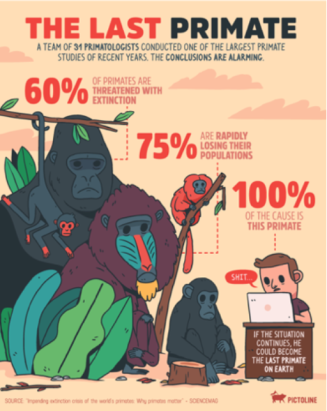Biosocial Conservation
Integrating biological and ethnographic methods to study human-primate interaction
Dr Joanna M Setchell
Professor in the Department of Anthropology, Durham University
Ethnography – the scientific description of peoples and cultures with their customs, habits, and mutual differences.
In addition to being an Anthropology Professor at Durham University, Dr Setchell serves as the President of the Primate Society of Great Britain and the Vice-President of the International Primatological Society. She is also a member of the Behaviour, Ecology and Evolution Research (BEER) Centre, and has studied the behavioural ecology, reproductive strategies, and sexual selection of mandrills (Mandrillus sphinx) for over 20 years.

Dr Setchell alerted us to the extinction crisis faced by primates all around the world, and nearly all of the threats to primates arise from anthropogenic activities. Habitat destruction through industrial and subsistence logging, the hunting for bushmeat, and for supply to the pet trade are the main threats faced by primates.
“Conservation is really about human behaviour.”
Dr Setchell split the sciences into two different kinds during her talk; Qualitative Life Sciences (QLS) and Quantitative Social Sciences (QSS). According to her, QLS starts off with an idea or a theory and possesses large sample sizes. On the contrary, QSS is exploratory and has very small sample sizes, sometimes just one. The former is representative of a larger population, while the latter does not represent any populations data.
Research by her students
Dr Setchell also talked about some of the research work carried out by her students and how that helps contribute towards human-primate interaction.
She brought up a few misnomers in the areas of conservation, such as ‘human-wildlife conflict’ and ‘crop raiding’ that has been observed by her students. For instance, ‘human-wildlife conflict’ creates a false conception that the animals are deliberately seeking conflict with humans and ignores the positive aspects of human-wildlife relationships. And a study by one of her research students Emilie Fairet, states that ‘crop foraging’ is more appropriate as compared to the term ‘crop raiding’. Crop foraging is resultant of seasonality and the animals treat it as part of their natural foraging behaviour, especially when farms are set up along their movement routes.
Another of her Dr Setchell’s research students, Kat Shutt worked on an interdisciplinary evaluation of gorilla ecotourism. Her main purpose was to find out why people watch gorillas and the effects gorilla ecotourism has on the gorillas. Habituated gorillas undergo immense levels of stress as compared to unhabituated ones, and this could result in the gorillas paying a heavy price for the very ecotourism that supports their conservation. Kat also covered the additional risks of disease transmission from humans to gorillas during habituation processes, and during ecotours.
My Reflection
Ethnography serves an important purpose in the development of conservation work. And given its positive returns on primate conservation, it should be adopted and applied to all other areas of wildlife conservation. Moreover, ethnography is non-invasive and puts very little to no stress on the environment and the animals while collecting data.

